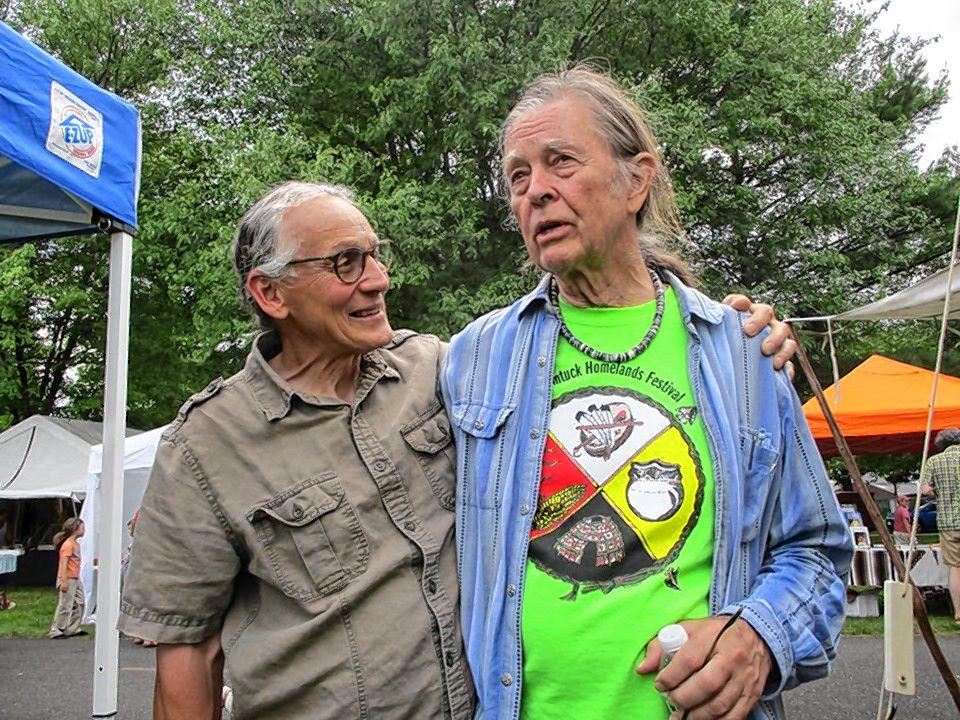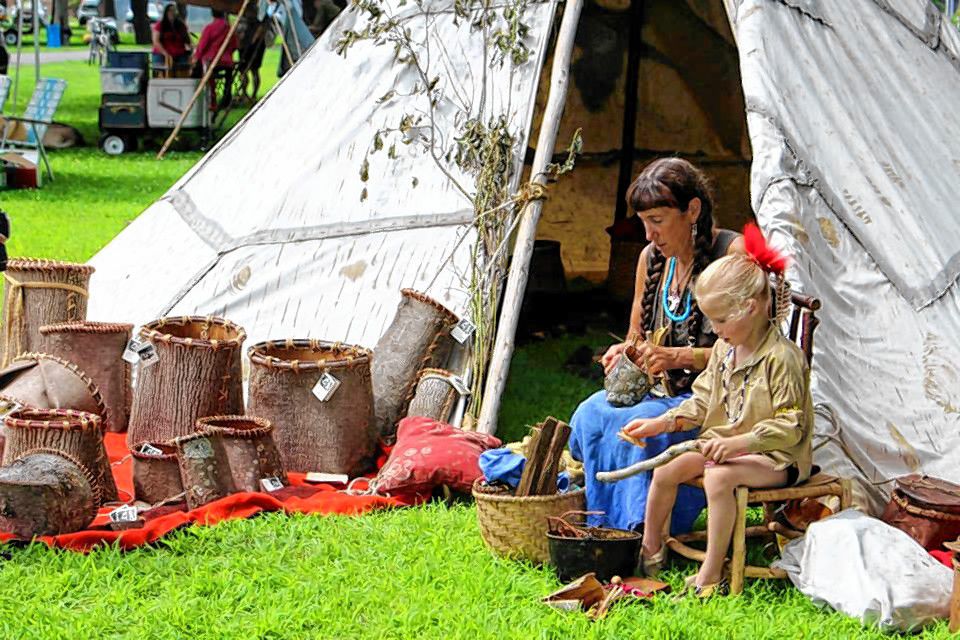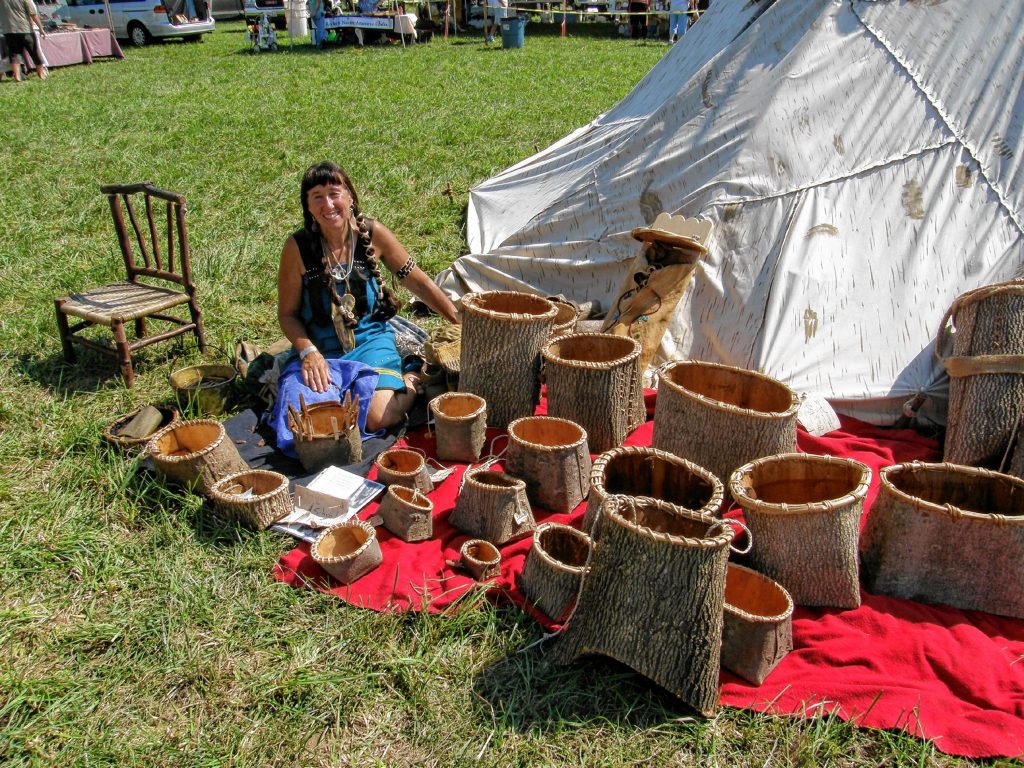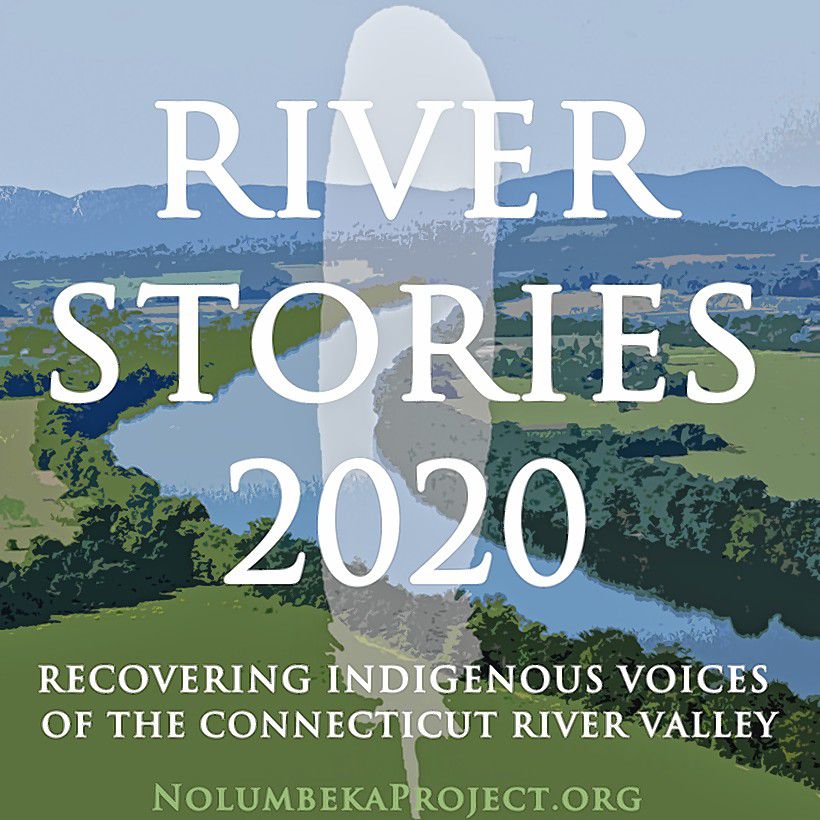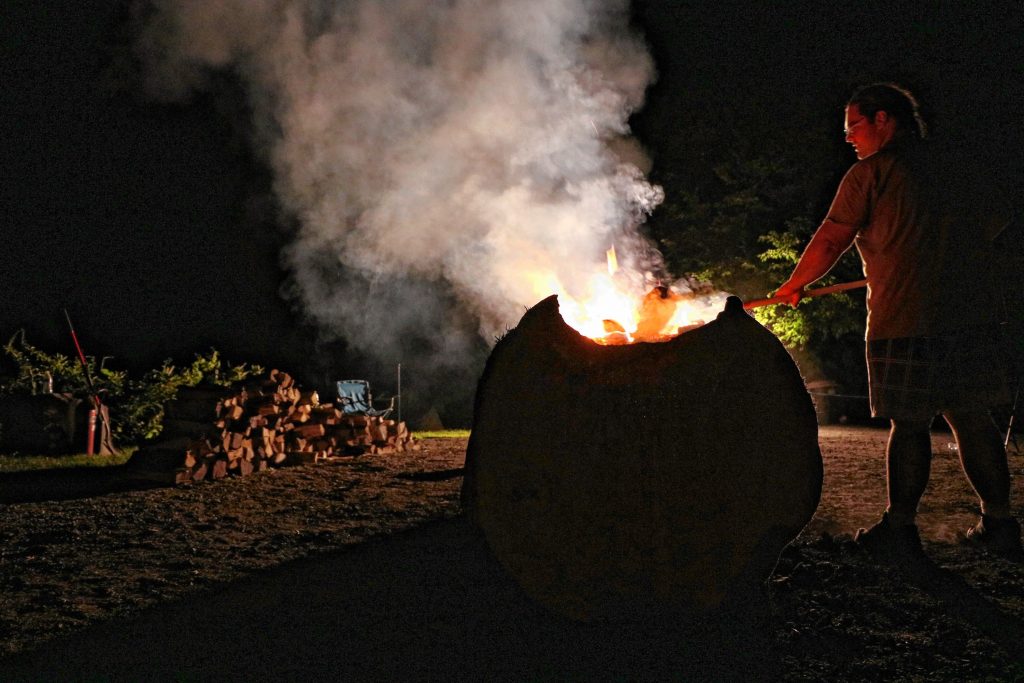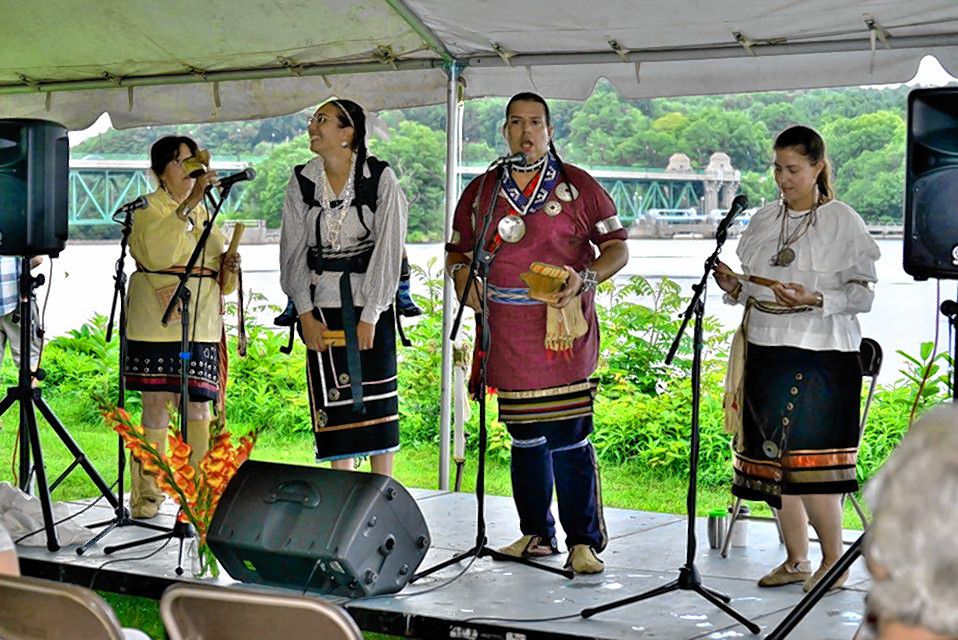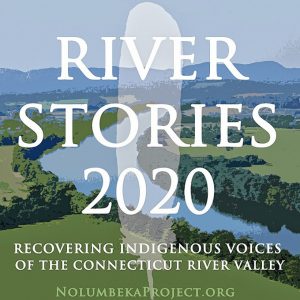Plymouth, Massachusetts, is gearing up for a big anniversary this year: It was in December 1620 that a group of English Puritans, who came to be known as the Pilgrims, landed on the shore of eastern Massachusetts and began to build a settlement that would eventually help shape some of the basic principles, traditions, and social and legal systems of the future American nation.
At least that’s how whitewashed history has painted the story.
Along the way, some of the events and people of the settlement would become part of American folklore, from the tradition of Thanksgiving and the legend of Plymouth Rock. And in recognition of how much the world was eventually changed by the 1620 landing, programs in The Netherlands and in England this year will also recognize the historic voyage of the Mayflower and the Pilgrims’ roots in both those countries.
In Massachusetts, an organization called Plymouth 400 is staging a broad series of events that officials say could bring 5 million visitors to the state this year.
But Native Americans in the Valley and elsewhere in New England are looking at the 400th anniversary through a different lens. For them, Plymouth Colony was the opening chapter of a far grimmer story, one in which regional tribes would be stricken by European diseases such as smallpox, forced from their land, and finally decimated by the violence of King Philip’s War in 1675-1676. It’s a fraught memorial, much like 2019, which marked 400 years since the introduction of African slaves to North America.
What might be worse, Native Americans say, is the perception that the Indigenous history of the Northeast is just that — history — and that Indians have long since vanished from this region. That’s simply not true, they say, which is why a number of tribes and a nonprofit group in Franklin County have planned a series of events this year to celebrate and recognize regional Native culture and history.
“River Stories 2020: Recovering Indigenous Voices of the Connecticut River Valley” will kick off this Saturday, Feb. 1, at Greenfield Community College with a traditional “Native American Social and Stomp,” a series of dances and talks led by members of the Abenaki and Wampanoag (the latter tribe was the first to make contact with the English settlers in 1620). This is just the first of about a dozen planned events that will be held up and down the Connecticut River Valley this year — at least one every month through November— mostly in Massachusetts but also in Vermont, New Hampshire, and Connecticut.
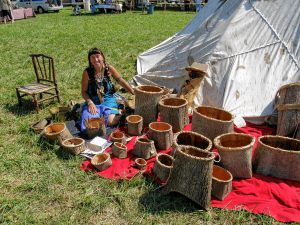
Jennifer Lee at a past Pocumtuck Homelands Festival in Turners Falls with some of the baskets she makes. “A lot of native culture has been lost, but a lot has survived,” she says.
From music and crafts, to storytelling and talks on Native agriculture and trading methods, to the launching in the Connecticut River of mishoons — traditional wooden dugout canoes made by burning out the center of a big log — the festivals and gatherings will offer a community spirit and a chance for Native people to celebrate what David Brule calls “a huge reemergence of these [Native American] stories.”
Brule, who lives in Montague, is the president of The Nolumbeka Project, a Greenfield-based nonprofit that has been involved for several years in a study, done in conjunction with the U.S. National Park Service and other groups, of the area around Turners Falls, site of the massacre of many Natives in May 1676 during King Philip’s War. Nolumbeka is an Abenaki word which means “a stretch of quiet water between the two rapids.” Project members have also been working to uncover other stories about regional tribes, says Brule, a writer and a former French teacher at Amherst Regional High School who discovered some years back that he has Native American and African American ancestry.
“We were keeping an eye on 2020 because we knew through the grapevine that Plymouth was doing something big,” he said during a recent interview. “But I remember thinking, ‘That’s going to be on the coast — what about us here in the Valley? What are we going to be doing here?’” Native populations in inland Massachusetts and other parts of New England, Brule adds, eventually “suffered a lot in the aftermath” of the Plymouth landing — especially during King Philip’s War, when perhaps as many as 5,000 Natives and over 2,000 colonists died.
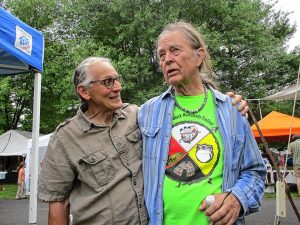
David Brule, at right, and Joe Graveline are the current and past presidents of the Nolumbeka Project, respectively. Brule, of Montague, is a key planner for River Stories 2020. Image from The Nolumbeka Project/Facebook
And given the attention Plymouth 400 will be devoting to the Pilgrims’ landing, the growth of the settlement and the eventual establishment of colonial New England — there will also be events that examine the history of the Wampanoag in eastern Massachusetts — Brule and other organizers of River Stories 2020 thought any anniversary focus here should be on Native people, especially members of tribes they’ve worked with most closely over the years: the Abenaki, Nipmuck, Narragansett, and Wampanoag.
“The idea was to reach out to people in their own homelands and say ‘We’ll find you the money and the venue, and you guys do what you want with it,’” said Brule. “The underlying theme is the impact that colonization had on [Native] people of the Valley, the interrelationships of people and the river.”
Jennifer Lee, a key organizer of River Stories, notes that The Nolumbeka Project has hosted a number of regular events for several years, including a “Day of Remembrance” in Turners Falls in May to honor those who died in the 1676 battle; there’s also the Pocumtuck Homelands Festival, in Turners Falls as well, an August gathering that she and Brule say typically draws thousands of attendees, including members of well over a dozen tribes. River Stories is an effort to build on that by pegging additional events to the anniversary of the fateful landing in Plymouth.
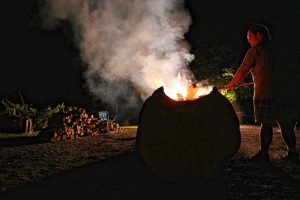
Jonathan Perry, of the Aquinnah Wampanoag, rakes coals last summer at Turners Falls from a log he’s hollowing out to make a mishoon, a traditional dugout canoe. Image from the Nolumbeka Project/Facebook
Lee, who lives in Plainfield, has Pequot and Narragansett ancestry (as well as Anglo and African American links). For her, River Stories and other educational events — she has helped bring Native American storytellers to schools and community centers in the Hilltowns, for instance — are all about combating the concept of erasure. “It’s a way to help non-Native people understand that Native people are still here,” she says.
“There’s also the trivialization of the culture, where anything Native was only taught in second grade or kindergarten, that it’s not as important as Catholicism or Judaism or other things,” adds Lee. “A lot of Native culture has been lost, but a lot has survived, and there’s a lot to be learned from it.”
She points to things such as respect for elders and for the environment, two longstanding traditions of Native American people, as well as the idea that “it’s better to give than to receive — status [in tribal culture] is defined not by how much you have, but how much you gave away, and that no one is more important than anyone else.”
‘Let’s do this ourselves’
Brule says he and some other Nolumbeka Project members were actually approached by a member of the Plymouth 400 planning committee a couple years ago about the idea of hosting Native American events in the Valley, which could then be linked to the Plymouth 400 website. But, he notes, the offer was basically, “‘If you join with us, you’ll have to use our logo,’ and that just didn’t feel right, so me and Diane [Dix, another Nolumbeka member] and a few others said ‘Let’s do this ourselves.’”
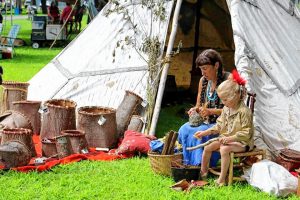
Jennifer Lee with her grandson outside her wigwam at a past Pocumtuck Homelands Festival in Turners Falls. Image from the Nolumbeka Project/Facebook
Still, Brule says Plymouth 400 is at least making the Wampanoag history part of the events in the celebration this year. It was the Wampanoag, after all, who helped the Pilgrims survive their first difficult years in America by teaching the colonists how to grow corn, squash, beans, and other crops and how to catch fish and process seafood.
In 1970, by contrast, a Wampanoag leader and Native activist, Wamsutta “Frank” James, was invited to give a speech at a Massachusetts state dinner as part of several events recognizing Plymouth’s 350th anniversary. But James was then denied a chance to speak when he refused to rewrite a draft of his address, which talked of his tribe being decimated by racism, disease, and violence in the wake of the Pilgrims’ landing.
Lee and another Nolumbeka activist, Kate Albrecht (she also lives in Plainfield), note that the events of River Stories 2020 are designed not to condemn white culture — the Pocumtuck Homelands Festival attracts a good number of non-Native visitors, they say — but to rediscover Native history and culture, and to find links between the two groups.
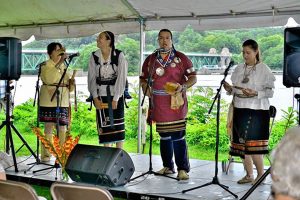
The Native singing group Kingfisher Singers performs at the Pocumtuck Homelands Festival in Turners Falls in 2018. Image from the Nolumbeka Project/Facebook
For instance, one specific goal of the series is to “reconnect Indigenous and non-Indigenous peoples with the rich diversity of the [Connecticut] River.” But another consideration is to help people who have Native roots but don’t know the details find more information about their ancestry.
“I know a lot of people in Western Mass who have some Native American heritage, but many of them don’t know what tribe they are,” says Lee. “There’s no connection. If you’re Jewish, you can find a synagogue. If you’re Christian, you can find a church. If you’re Native American, where do you go? DNA testing won’t bring you into a community. It’s not going to inform you about the culture.”
Even Natives who know their identity may not know the whole history of their people. Liz Santana Kaiser, a member of the Nipmuck Nation who grew up in Worcester, says she was always aware of her roots but did not learn until very recently that members of her tribe were among those killed at the Battle of Turners Falls in 1676. “I want to be a part of getting those kinds of stories out there,” says Kaiser, who will be part of a River Stories presentation in September at the Hitchcock Center in Amherst.
At pow-wows and other Native gatherings, Lee says, Natives can find community and learn more about their roots. “A pow-wow is always about teaching. It’s way to be a part of something bigger when you dance together; it’s not always about showcasing your best dancing.”
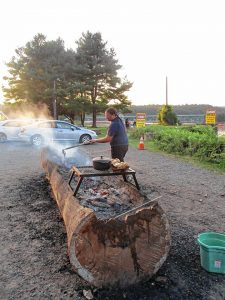
Jonathan Perry, of the Aquinnah Wampanoag, rakes coals last summer at Turners Falls from a log he’s hollowing out to make a mishoon, a traditional dugout canoe. A group of these boats will be launched in the Connecticut River this summer as part of River Stories 2020.
At Saturday’s Greenfield Community College event, which runs from 1-4 p.m., Chief Roger Longtoe Sheehan, of the Elnu Abenaki, will read an opening prayer, and then Annawon Weeden, of the Mashpee Wampanoag, and James Moreis, of the Aquinnah Wampanoag, will teach and lead Northeastern Woodlands Native social dances. Lee says these “stomp dances,” with rattles providing percussion and beat, can be “very simple, almost meditative, where you follow the dancer in front of you, and if they’re having trouble, you look at the lead dancer.” Some dances are a little more complicated, she adds, “but they’re all about community, too.”
Brule says he also feels River Stories is a kind of a culmination of an effort to recover and preserve local Native culture and history that really began back in the first decade of the new millennium. That’s when activists rallied to stop a proposed expansion of a runway at the Montague airport, where developers wanted to bulldoze a hill that Natives considered sacred because of the placement of prayer stones there. Brule says the plan was eventually quashed by a federal advisory board in Washington, D.C., under the provisions of the National Historic Preservation Act.
“According to the tribal people we work with, that was the beginning of a change in the balance [of life], when good things started flowing after that, and we said ‘We gotta keep this going,’” says Brule. “The idea for the battlefield study came around, then our outreach to schools, then the 2020 events … and [officials with] Turners Falls really worked with us to recognize the history of the [1676] battle, making peace between Natives and non-Natives.
“Now we want to keep the ball rolling and keep getting more of that history out there,” he adds. “There’s so much to tell.”
Steve Pfarrer can be reached at spfarrer@valleyadvocate.com.
The kickoff event for River Stories 2020 takes place Saturday, Feb. 1, at the Cohn Dining Room at Greenfield Community College beginning at 1 p.m. Snow date is Sunday, Feb. 2. For more information about the full schedule of events for River Stories and the work of The Nolumbeka Project, visit nolumbekaproject.org and/or facebook.com/nolumbekaproject.

